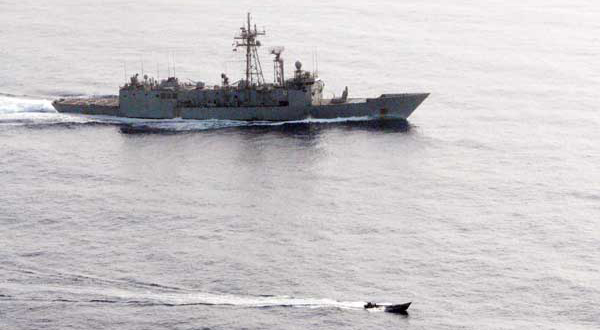 BRUSSELS: Somali pirates seized a freighter with 24 Syrian and Egyptian crew members in the lawless waters of the Gulf of Aden, the EU's anti-piracy force said, reporting the second pirate capture this week.
BRUSSELS: Somali pirates seized a freighter with 24 Syrian and Egyptian crew members in the lawless waters of the Gulf of Aden, the EU's anti-piracy force said, reporting the second pirate capture this week.
The Syria Star, flagged in Saint Vincent and Grenadines, radioed for help on Thursday and "reported that she was under attack from pirates who had climbed onboard and fired shots at the crew", said the European Union NAVFOR Somalia mission.
Helicopters were dispatched and tried to establish contact with the ship, which was carrying a cargo of sugar, but they found only an abandoned skiff nearby containing fuel and ammunition, the force said in a statement.
"When warships arrived on the scene shortly after, the Syria Star had reversed course and was heading South East back towards the Horn of Africa under the control of the pirates, who refused to respond to radio contact."
The vessel's crew was predominantly Syrian and there were only two Egyptians.
It was the second pirate seizure this week.
On Monday, the sea bandits captured a Panamanian freighter with 23 crew from Egypt, India, Pakistan and Sri Lanka in the Gulf of Aden.
A day later, a Spanish warship foiled an attack on a Norwegian chemical tanker off the Horn of Africa. The vessel was holding seven suspected Somali pirates pending possible prosecution.
This week, a Saudi insurance company said it would pay a $20-million ransom to free a hijacked ship and its 14-member crew held hostage for five months.
"The owner of the Al-Nisr Al-Saudi ship, which was hijacked by Somali pirates, said the insurance company has agreed to pay a ransom of $20 million to win the release of the ship and its 14-member crew," Arab News said on Monday.
The pirates had been torturing the crew of 13 Sri Lankans and one Greek as well as threatening to kill them unless the ransom was paid, the daily quoted the ship's owner, Kamal Arri, as saying.
The tanker, he said, was not carrying any oil when the pirates captured it in the Gulf of Aden in March as it sailed back from Japan to the Saudi port of Jeddah.
Arri said his company had so far lost about $8 million as a result of the hijacking.
Foreign naval powers have deployed dozens of warships since 2008 in a bid to secure the Gulf, a crucial maritime route leading to the Suez Canal through which tens of thousands of merchant vessels transit each year.
But pirates have gradually extended their area of operations, seizing ships as far east as the Maldives' territorial waters and as far south as the Canal of Mozambique.
Naval missions, including the European Union's Atalanta deployment, have boasted success in curbing attacks but the number of hijacked ships and detained seafarers remains at one of its highest levels since Somali piracy surged in 2007.
Unofficial figures show 2009 was the most prolific year yet for Somali pirates, with more than 200 attacks — including 68 successful hijackings — and ransoms believed to exceed $50 million in total.



